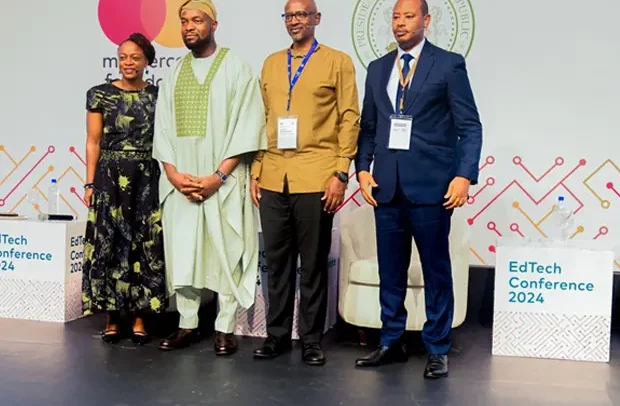(From left) Rosy Fynn, Dr. Bosun Tijani, Joseph Nsengimana, and Albert Nsengiyumva at the EdTech conference
The Mastercard Foundation, an international non-governmental organization has convened its inaugural EdTech conference on resilient and inclusive learning in Africa with an important question.
“How do we build resilient and inclusive EdTech ecosystems?” asked Rosy Fynn, Mastercard Foundation Country Director Nigeria, in a room of over 500 people.
She posed this question to a high-level opening panel: Dr. Bosun Tijani, Nigeria’s Minister of Communications, Innovation, and Digital Economy; Joseph Nsengimana, Director, Mastercard Foundation Centre for Innovative Teaching and Learning; and Albert Nsengiyumva, Executive Secretary, Association for the Development of Education in Africa (ADEA).
Dr. Tijani pointed out the need for a growing literacy agenda where Africans can be digital literates.
The event, themed “Education Technology for Resilient and Inclusive Learning in Africa” had speakers advocate for leveraging technology to promote inclusive education across Africa and support the continent’s burgeoning youth population.
Panelists also discussed funding opportunities for education technology startups, the role of technology in advancing education at all levels, and the importance of preparing Africa’s youth for success in the digital age.
Dr. Tijani also stated that, “Our goal is to ensure that every young person in Africa has the opportunity to succeed in the digital age.”
He stressed on the transformative power of education and technology and encouraged partnerships between startups and government to strengthen EdTech across Africa.
Highlighting the importance of public-private partnerships in driving innovation, Joseph Nzingamana, noted, “Collaboration between governments, industry leaders, and educators is crucial in developing sustainable solutions for inclusive education.”
Additionally, he noted that, “We at Mastercard Foundation believe in collaboration and it’s the reason we have this conference so we can find ways of working together to extend the reach especially for underserved population across the continent.”
Emphasizing the need for innovative approaches to address the challenges facing education in Africa, Albert Nsengiyumva, said, “By leveraging technology, we can create more accessible and inclusive educational opportunities for all.”
He, however, harped on a demand driven approach for technology education stating that “from the design we need to start with the learners and understand their needs, because the aim is to use education technology to address specific needs of learners.”
Furthermore, Mr. Nsengiyumva cautioned on the misconception on the relationship between teachers and technology noting that “technology will not replace the need for good teachers. Rather, good teachers should be empowered by technology.”
A Business Desk Report


